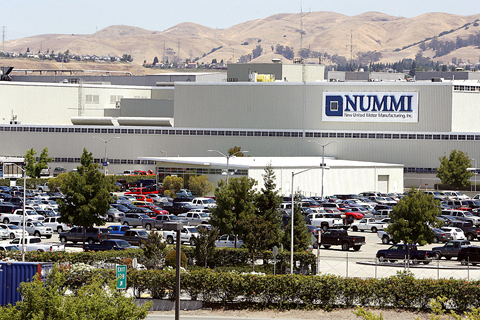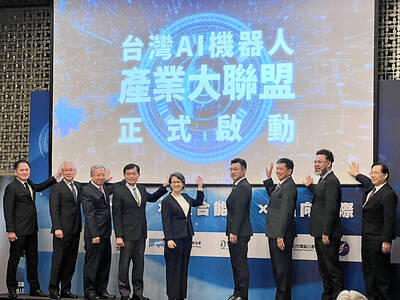Toyota expects to lose money in North America even as it prepares to sell more cars in the US than a restructured General Motors, a senior executive said in Detroit.
Yoshimi Inaba, the new chairman and CEO of Toyota Motor Sales USA, said he hopes the company’s North American operations can return to profitability during its next fiscal year, which begins next April.
“It’s a challenge. I guess I’ve just set myself a very big goal,” he said during a meeting with reporters on Thursday. “Our strength is our ability to meet local needs. I don’t see how Toyota can be profitable again without being profitable in North America.”

PHOTO: BLOOMBERG
Inaba said it is quite likely that Toyota could emerge as the top car seller in the US if the predictions that General Motors is destined to lose market share after shedding brands and downsizing operations prove accurate.
“Toyota tried very hard to become No. 1” globally as it doubled sales world wide in the last eight years, but is not actively working to surpass GM in the US, he said.
“It’s not that we want to be No. 1 [in the US], it’s because of how things worked out,” he said.
Inaba cautioned that Toyota’s rapid growth also came at a price, leaving it vulnerable when sales dropped simultaneously in the US, Japan and Western Europe. Inaba expressed confidence that the US market will recover from its current slump, but cautioned that it will take time.
“There is a little pulse in the market. The market can’t get any worse,” he said.
The fundamentals of the US economy — and its lack of sufficient public transportation — mean that auto sales will eventually return to their previous highs, he said.
“We can still be very excited about this market,” he said.
However, Inaba cautioned that Toyota is facing stiff competition from Hyundai, Ford and other automakers.
“We see what many, many of our competitors are doing,” Inaba said. “They are doing a good job of catching up.”
Toyota has not yet determined the fate of a California plant it ran as a joint venture with General Motors, he said.
GM announced plans to withdraw from New United Motor Manufacturing Inc as it restructured under bankruptcy protection.
“We are looking at the viability of NUMMI. There is a likelihood that we would not buy the rest of NUMMI [from GM],” Inaba said.
But it is not clear if Toyota will end up closing the plant, which employs more than 5,400 people and is Toyota’s only unionized plant in the US. The United Auto Workers union is negotiating to save the plant, but has not said whether it will offer Toyota the same concessions granted to the Detroit Big Three.
“There are a number of difficult and complex issues that we need to address before making any final decisions,” Inaba said.

The paramount chief of a volcanic island in Vanuatu yesterday said that he was “very impressed” by a UN court’s declaration that countries must tackle climate change. Vanuatu spearheaded the legal case at the International Court of Justice in The Hague, Netherlands, which on Wednesday ruled that countries have a duty to protect against the threat of a warming planet. “I’m very impressed,” George Bumseng, the top chief of the Pacific archipelago’s island of Ambrym, told reporters in the capital, Port Vila. “We have been waiting for this decision for a long time because we have been victims of this climate change for

MASSIVE LOSS: If the next recall votes also fail, it would signal that the administration of President William Lai would continue to face strong resistance within the legislature The results of recall votes yesterday dealt a blow to the Democratic Progressive Party’s (DPP) efforts to overturn the opposition-controlled legislature, as all 24 Chinese Nationalist Party (KMT) lawmakers survived the recall bids. Backed by President William Lai’s (賴清德) DPP, civic groups led the recall drive, seeking to remove 31 out of 39 KMT lawmakers from the 113-seat legislature, in which the KMT and the Taiwan People’s Party (TPP) together hold a majority with 62 seats, while the DPP holds 51 seats. The scale of the recall elections was unprecedented, with another seven KMT lawmakers facing similar votes on Aug. 23. For a

Taiwan must invest in artificial intelligence (AI) and robotics to keep abreast of the next technological leap toward automation, Vice President Hsiao Bi-khim (蕭美琴) said at the luanch ceremony of Taiwan AI and Robots Alliance yesterday. The world is on the cusp of a new industrial revolution centered on AI and robotics, which would likely lead to a thorough transformation of human society, she told an event marking the establishment of a national AI and robotics alliance in Taipei. The arrival of the next industrial revolution could be a matter of years, she said. The pace of automation in the global economy can

All 24 lawmakers of the main opposition Chinese Nationalists Party (KMT) on Saturday survived historical nationwide recall elections, ensuring that the KMT along with Taiwan People’s Party (TPP) lawmakers will maintain opposition control of the legislature. Recall votes against all 24 KMT lawmakers as well as Hsinchu Mayor Ann Kao (高虹安) and KMT legislative caucus whip Fu Kun-chi (傅崐萁) failed to pass, according to Central Election Commission (CEC) figures. In only six of the 24 recall votes did the ballots cast in favor of the recall even meet the threshold of 25 percent of eligible voters needed for the recall to pass,